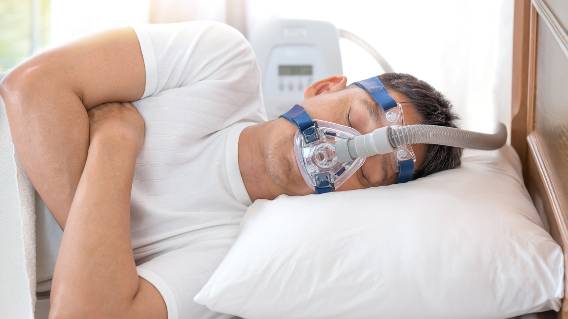Lilly’s Zepbound Shows Promising Results in Sleep Apnea Clinical Trials
Editors carefully fact-check all Consumer Notice, LLC content for accuracy and quality.
Consumer Notice, LLC has a stringent fact-checking process. It starts with our strict sourcing guidelines.
We only gather information from credible sources. This includes peer-reviewed medical journals, reputable media outlets, government reports, court records and interviews with qualified experts.

People who suffer from sleep apnea could soon benefit from a new treatment option, as tirzepatide, initially developed for weight management, has proven to reduce sleep apnea severity and promote significant weight loss.
In two recent clinical trials conducted by pharma giant Eli Lilly, people who suffered from moderate-to-severe obstructive sleep apnea (OSA) and took Zepbound (tirzepatide) injections had reduced apnea-hypopnea index numbers. The patients in the trial also saw nearly 20% weight loss during the 52 weeks.
“OSA impacts 80 million adults in the U.S., with more than 20 million living with moderate-to-severe OSA. However, 85% of OSA cases go undiagnosed and therefore untreated,” Jeff Emmick, senior vice president of product development at Lilly, said in a statement.
“Addressing this unmet need head-on is critical, and while there are pharmaceutical treatments for the excessive sleepiness associated with OSA, tirzepatide has the potential to be the first pharmaceutical treatment for the underlying disease.”
Lilly has received U.S. Food and Drug Administration Fast Track approval for Zepbound use for moderate-to-severe OSA and obesity. The company says it plans to submit to the FDA and other regulatory agencies starting mid-year.
These clinical trials follow litigation against CPAP machine manufacturer Philips Respironics, which is facing lawsuits from people who have developed lung cancer or suffer other lung issues from recalled CPAP machines.
Two Clinical Trials Show Promise
Lilly’s first 52-week study called SURMOUNT-OSA Study 1 tested tirzepatide on adults who suffered from moderate-to-severe sleep apnea and obesity and were not using positive airway pressure (PAP) therapy.
The results showed that those in the trial who took the medication greatly reduced the number of sleep interruptions compared to those in the trial taking the placebo, according to the company. Trial results showed patients had about 27 fewer sleep apnea events per hour compared to those on placebo.
Investigators also noted patients on tirzepatide lost an average of 18.1% of their body weight, compared to just 1.3% for those taking a placebo.
The second trial had similar successful results. This 52-week trial focused on patients who had similar issues but were already on PAP therapy. The results of this trial showed patients on the medication had about 30 fewer events per hour, compared to six for the placebo. Patients on the medication lost an average of 20.1% of their body weight, compared to 2.3% from baseline for placebo.
The study’s patient population consisted of about 70% men, who typically experience less weight loss from incretin therapy, a type of diabetes medication, compared to women.
Side Effects of Tirzepatide
GLP-1 drugs like Zepbound have recently risen in popularity in the U.S. and across the globe because of their ability to help people lose weight. There have been many positive side effects — like those in the sleep apnea study.
But there are still concerns. Zepbound is known to be associated with possibly causing thyroid tumors and thyroid cancer. It can also cause severe stomach problems and issues with the kidneys, gallbladder and pancreas or cause a serious allergic reaction.
Other weight loss drugs that use semaglutide as an active ingredient, like Ozempic and Wegovy, have been linked to stomach paralysis and intestinal blockages. At least 55 Ozempic lawsuits have been consolidated into multidistrict litigation in the Eastern District of Pennsylvania.
People who took Ozempic for Type 2 diabetes or took Ozempic for weight loss claim they developed serious side effects like gastroparesis, severe vomiting, ileus or intestinal blockages while using Ozempic.
Lawyers are still taking on cases in those lawsuits.
![]()